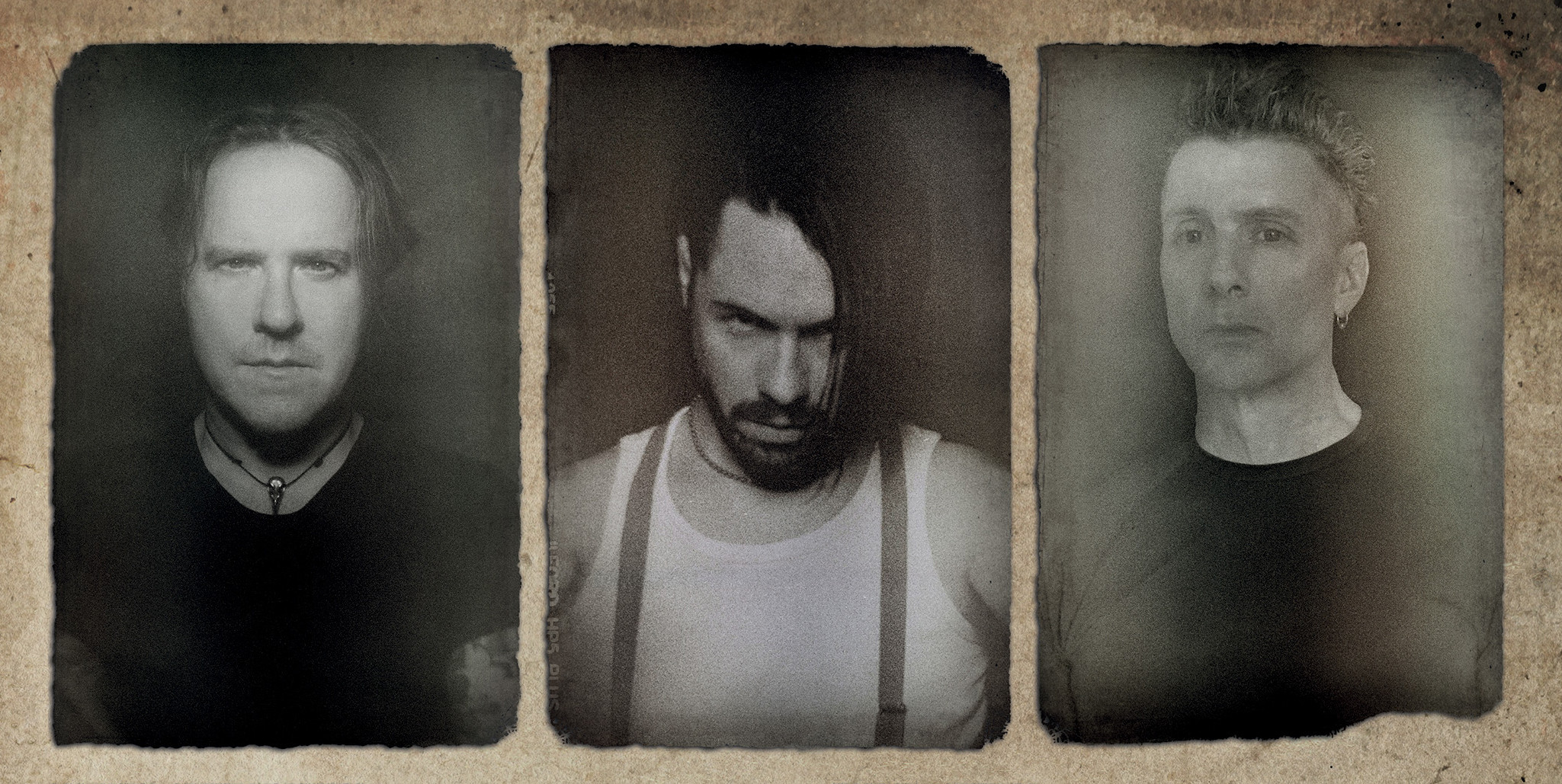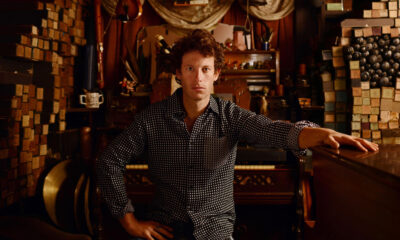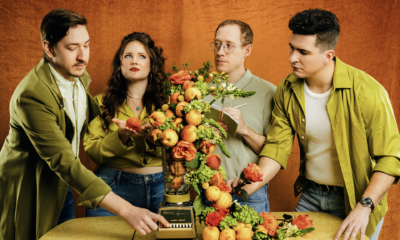Alternative/Rock
In Conversation with Burton C. Bell: The Return of Ascension of The Watchers [w/ Audio]

For almost 30 years, vocalist Burton C. Bell has been a household name in the metal world, most notably due to his prominent role within influential Los Angeles industrial metal juggernauts Fear Factory. With recent events leading to Burton quitting the band, the arrival of a new Ascension of The Watchers album could not have come at a better time to allow the fluid continuation of his creative endeavours.
A much less scathing prospect than his former day job, Ascension of The Watchers represents Burton’s true musical passions and influences and, with Apocyrpha being the band’s first release in twelve years (and now comprising of Burton, keyboardist John Bechdel and drummer, backing vocalist and programmer Jayce Lewis), he was keen to discuss the new album as well as the concepts and inspirations that became the basis for the project.
We caught up with Burton a few days before the release of Apocyrpha and, despite receiving the sad news of Eddie Van Halen’s passing during our chat, we did manage to discuss the album that has now been a decade in the making.
“I was inspired when this project started and before we had a name,” says Burton as we begin with the origins of the band name. “I was doing a lot of reading, I read all types of different things. I like reading educational and historical books about religion and spirituality. I was reading this book by Elaine Pagels called The Origin of Satan, and in that book she referenced The Book of Enoch and the Dead Sea Scrolls, and she mentioned The Watchers (which I thought was interesting), so after finishing that book I did some research and found a version of The Book of Enoch and started reading that, and that’s when my interest in The Watchers became really piqued because for me at that point in time, I related to it in some way – there was the band of angels that abandoned heaven, descended upon earth to take human wives, to mate with them and teach them the stars, the ways of fire, writing… kind of like a Prometheus type of thing. So I found that very interesting and inspirational, and I decided to relate my music and the words I was writing as if it were one of these angels that has been persecuted to earth forever and ever between the cracks and the rocks and the dirt, never to go up to heaven and their prayers never to be heard ever again. So that’s where the inspiration came from.”
With such a spiritually significant concept used to define the band, I asked Burton if it’s something spiritual to him on a personal level, or whether it’s merely an interesting idea to use for a musical project. “I would say all of it,” he replies. “For me, this is the music of my soul, this is what I hear in my head. I’ve had moments or poignant events in my life that would make me sit down and get these words or sounds out of my head into a guitar or a piano, and I would just sit and play. So for me it’s a very personal take, and my personality is that I do tend to be… not religious, but I tend to think on the more spiritual side in a positive nature and I think about these aspects of life a lot.”
With the album title also relating to similarly spiritual concepts, we discuss the word ‘apocrypha,’ which it turns out is significant to this release. “The term ‘apocrypha’ (refers to) texts that are suppressed or lost to history and then recovered, for instance the book of Mary Magdalene is an apocrypha from the Old Testament that’s been suppressed by the Church over the years,” he explains. “So for me, this album is actual moments that happened in my life, to sit down and write, over the past ten to twelve years through the recording, and for me, these are words that have been lost in time to be revealed once this album has opened. So it’s ‘ancient texts’ that actually happened to tell a moment in history, of my history.”
Not one to shy away from his non-metal influences (my personal discovery of Nick Cave for example came after reading an old Fear Factory interview that mentioned Murder Ballads), we go on to discuss how Ascension of The Watchers is much more closely tied to Burton’s personal taste in music. He grins as he lifts his coffee mug up to the chat window, which has the slogan ‘Bad Seed’ written on it. “I’m still a huge fan of Nick Cave,” he admits. “For me, even though I was part of a metal industrial band for so long, I’ve never hidden the fact that I’m not a big ‘metal guy.’ I come from more of the post-punk, goth, industrial type of sounds, those were what really inspired me, and that’s the type of music I’ve been listening to throughout my career, and inspired me to work on Fear Factory and also G//Z/R, City of Fire, and now Ascension of The Watchers, this is the music in my mind. It’s strange that I’m finally able to release music that I feel represents me more closely than anything else.”
The press release calls Apocrypha the ‘soul without the machine,’ an accurate description for the band’s contrasting sound when considering Fear Factory’s mechanical onslaught. The abundance of atmosphere and emotion within the latter’s music, something that in no small part can be attributed to Burton’s vocals over the years, has certainly been brought over to Ascension of the Watchers, yet will the distinct lack of caustic industrial metal be a sticking point for Fear Factory fans? I put it to Burton that this (hopefully) won’t be the case, as the ‘soul’ is loved as equally as the ‘machine.’
“I think so too,” he replies. “Of course I do realize that this album is not for everybody, not every Fear Factory fan is going to like it, but if these fans listen to the new Watchers album, they will hear those familiar elements from Fear Factory, because this is something that I brought to the table so there’s a familiarity about it, but like you say it’s just not the face-melting blast beats and the heavy riffing guitars, it’s very melodic, melancholic, spacious… and (there’s) a lot of ambient movements in it.” With so much genre cross-pollination and musical evolution over the past decade or two, it feels like a much smaller percentage of those who would consider themselves ‘metalheads’ in 2020 are closed off to the idea of enjoying other genres. “I would agree with that, absolutely,” says Burton. “Because there’s so much music available to us so easily, that people can find something in any genre… they can find something that they can connect with. I’m hoping that these diehard metal fans will pick this up, check it out and give it a chance.”
With Apocrypha having been written over a period of ten years, it wasn’t until a successful Pledgemusic campaign provided the band with the promise of the funding required to finally get the album recorded. Unfortunately, Pledgemusic went bust and they lost all of the money, yet after so many years of writing, nothing was going to stop them from ploughing on. “I had demoed the ideas over ten years at various times, and over time we would build upon them. I would come with the ideas and record the guitar arrangement and then we would build upon that, and it wasn’t until after the Pledgemusic campaign that we had this money in the pipeline and we could actually record it.”
Burton continues to explain, “But then the whole Pledgemusic thing failed everybody, so for us to finish we borrowed money from family and loved ones, knowing that we’d be able to pay them back. For the concept of the recording, I spoke to Jayce at length about what I personally wanted to achieve on the album, and from the last record Numinosum, which came out in 2008… it was when we were playing those songs live that I realized that the songs sounded the way I wanted them to (in a live environment). This is how I picture this band, sonic energy, organic, spacious ambience intertwined with the sonic intensity, and I wanted to capture that live aspect, so that was one of my goals and Jayce was able to succeed, mostly because of his talent as a producer and mixer but also his studio (Northstone Studios) is the studio that I’ve always wanted to record in. It’s a modern analogue studio and I believe we were able to capture what we were trying to create.”
Apocrypha sounds remarkably cohesive for an album that’s been in the making for so many years. I asked Burton how difficult it was to keep track of every idea he had over the past decade, and how this then translated in the studio. “As an artist, I made the decision to let go of the production side (as a controller) and let Jayce do his thing. I already knew that Jayce was a highly talented individual, not just as a musician but also as a producer and mixer, so I decided that for this to succeed, I need to personally let it go forward and it’s not going to be me as the one to make that happen (and) it has to be someone else, someone I trust, but (also) someone who can help me make that step,” he said. “But if it weren’t for all of the writing that I did in my journals and notes I’ve made over the years, I would have never remembered any of it! I came to the studio with two or three different journals of lyrics and ideas and thoughts on the whole process.”
With Jayce’s studio being deep in the heart of Wales and built on the site of an ancient monastery, it comes as no surprise that some unexplained happenings occurred during the recording process – happenings that can actually be heard at the start of the title track. “I’m going to go as far as to call it an ‘EVP moment!’” says Burton. “I can’t explain it and Jayce can’t explain it, and it’s something that happened while we were there, and neither of us made that sound. We were recording the vocals for the song ‘Apocrypha,’ and I decided to take a break for a few minutes, and Jayce took that time to start cleaning up the tracks and moving things around, and as I was relaxing, Jayce goes, ‘What did you say there at the end? You said something at the very end of the track where there’s no music.’ So I went into the studio to listen the wav file and we turned it up and we heard the sound of the wooden door between the live room and the control room opening, that creaking sound, and without hearing anything else, we heard that the gain went up, so when the gain goes up it’s like a very high ambient white noise that will pick up anything, but you don’t hear anything.
The door was open so you would’ve definitely heard Jayce or I speaking because it’s not that big of a place, but all you hear is this distant whisper, and if it was me whispering into the microphone with the gain up that much, it would have blown the mic! This whisper was still so low that it captured it perfectly. My hair stood on end, it was creepy! Then the door closes. We played it over and over again, I don’t know what language it’s in or what it’s saying. It could be ancient Gaelic or ancient Latin… the manor is built on the ruins of an ancient monastery (and the building that was there before was even older) so who knows! I believe in science, but I do believe that energy is a constant and there’s things that we still do not understand. I couldn’t explain it, but to me I think that’s an actual EVP moment caught on tape. Whoever’s talking to us from across dimensions made a point to contact us on that song! It’s crazy.”
Ending the album is a cover of the Terence Trent D’Arby classic “Sign Your Name,” a song that Burton has wanted to cover for a long time and put his personal stamp on it. “I thought of that years ago, even before there was a Watchers, there was something about the song… I love the song to begin with, and I thought, ‘I’m going to make my own version of it’ and that’s actually the one song that I worked on the most over the years, for one to reinterpret it the way I would do it,” he says. “I would play it on guitar and I had all these ideas… originally it was just going to be me and the acoustic guitar all by itself, but the producer I worked with on that song, we worked on this together and I said I wanted to add a little sugar to this thing, and what he did just blew my mind… He took that whole song exactly the way I pictured it, and I made it my own.”
Having initially mistaken it for an original song, I discuss cover songs and the unique identity they can take on when treated like a song from a band’s own repertoire. “Absolutely,” he says, “I think that’s important. If you’re going to cover a song, then you’ve gotta reinterpret it and make it your own.”
With the COVID-19 outbreak making touring impossible this year, I asked Burton to further explain his future plans for Ascension of The Watchers and what he calls ‘conceptualized touring.’ “We are working with an agent to start booking shows for when bands can start touring again, although that might not be until August or September (2021) but when I say ‘conceptualized touring,’ my goal is to create an atmosphere that really matches the mood of the music, dark and moody, ambient,” he explains. “Visuals behind us as we’re playing, nothing synaptic but just something that creates an ambience that really draws you in while you listen to the music.”
With the current climate proving extremely difficult for anyone involved in the arts, touring bands included, Burton mirrors what so many of us understand yet can do very little about. “It’s impossible,” he says. “It’s really sad because music was the first industry to close, it’s going to be the last one to open, and they don’t realize that the music industry employs millions of people around the world, not just musicians but the road techs, the agents, the managers, to the people in the venues and the venues themselves, the merchandise companies… it goes on and on. To me, it’s more essential than Wall Street, it’s more therapeutic than Wall Street. Why do we have to suffer?”
With Apocrypha now released and two of the songs having been given the music video treatment, I finish the interview by asking Burton about the wonderfully animated videos for “Ghost Heart” and “The End Is Always The Beginning,” and if he had any hand in their creation or direction. “No, not at all,” he says. “The director Victor Hugo-Borges, he’s a Brazilian filmmaker. We started working with him on the last record Numinosum and he did the video for ‘Residual Presence’ and so of course I wanted to work with him again and so luckily he did. He just took the song and he repurposed footage that he didn’t use, to fit the narrative of ‘Ghost Heart’ and ‘The End Is Always The Beginning.’ I didn’t have any input, I supplied him with the music and that was all the input I had, so the rest was up to him. He’s a fantastic filmmaker and this is what he came up with and I instantly loved it.”
But is that a mini cartoon Burton I spotted in the video for “Ghost Heart?” “(laughs)! No, but one of the plans is that he’s going to create images of the band to make a video, so hopefully that will happen soon. We’ll see how it goes!”
Many thanks to Burton for his time. Apocrypha is out now on Dissonance Records.
-

 Music4 days ago
Music4 days agoTake That (w/ Olly Murs) Kick Off Four-Night Leeds Stint with Hit-Laden Spectacular [Photos]
-

 Alternative/Rock5 days ago
Alternative/Rock5 days agoThe V13 Fix #010 w/ High on Fire, NOFX, My Dying Bride and more
-

 Hardcore/Punk2 weeks ago
Hardcore/Punk2 weeks agoHastings Beat Punks Kid Kapichi Vent Their Frustrations at Leeds Beckett University [Photos]
-

 Culture2 weeks ago
Culture2 weeks agoCirque Du Soleil OVO Takes Leeds Fans on a Unique, Unforgettable Journey [Photos]
-

 Alternative/Rock2 weeks ago
Alternative/Rock2 weeks agoA Rejuvenated Dream State are ‘Still Dreaming’ as They Bounce Into Manchester YES [Photos]
-

 Features4 days ago
Features4 days agoTour Diary: Gen & The Degenerates Party Their Way Across America
-

 Culture7 days ago
Culture7 days agoDan Carter & George Miller Chat Foodinati Live, Heavy Metal Charities and Pre-Gig Meals
-

 Music6 days ago
Music6 days agoReclusive Producer Stumbleine Premieres Beat-Driven New Single “Cinderhaze”














